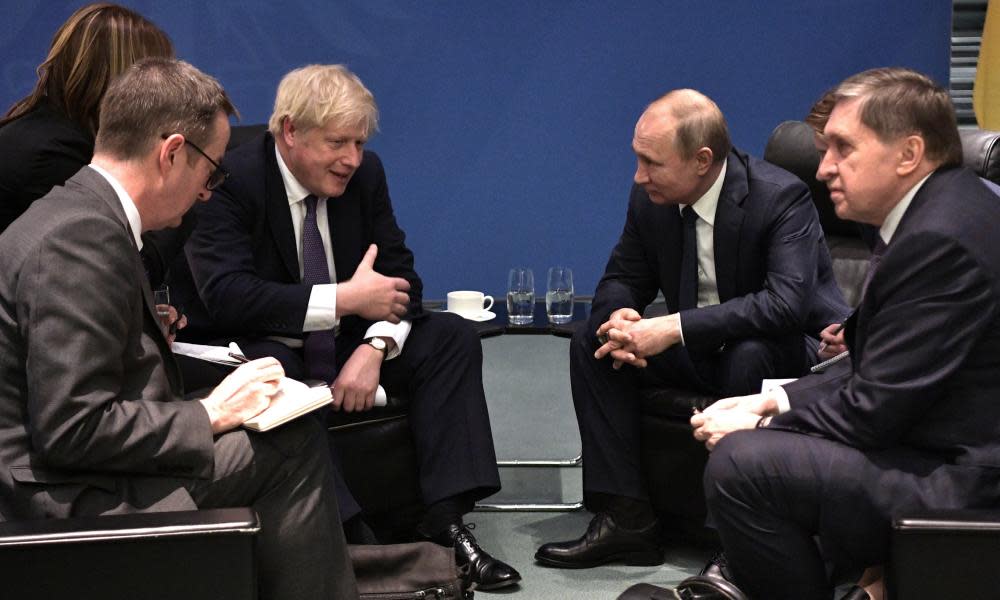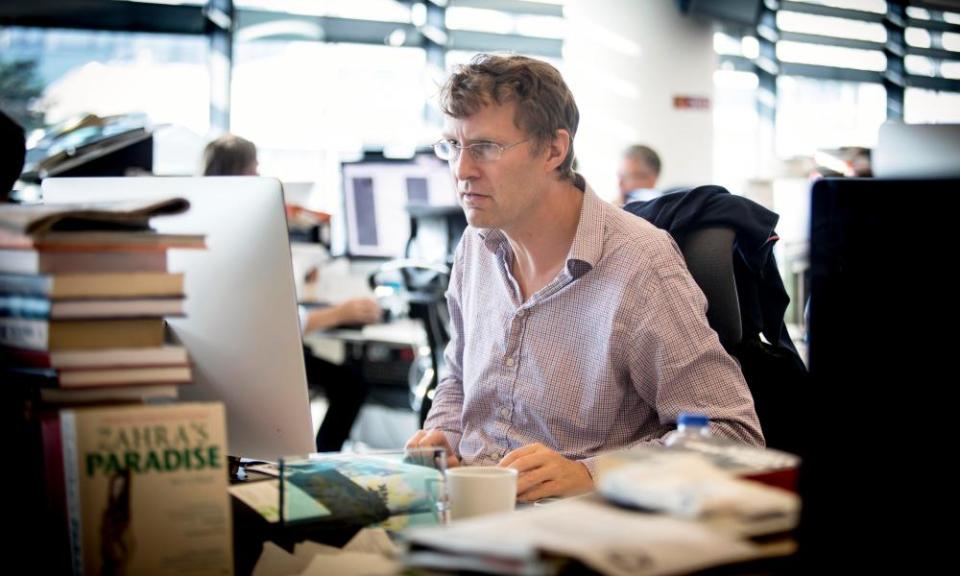Covering Russia and the west: 'Putin's goal is to make the truth unknowable'

You have reported extensively on Russia’s interference in western politics. What significance does this latest chapter have?
Putin is not a super-villain sitting in a cave in front of a console with red flashing buttons. He is a classic KGB opportunist. His talent is sniffing out weakness. During the cold war, Moscow sought to undermine the west – the US and Britain in particular. Putin uses the same playbook, but far more effectively. Russian operatives helped Donald Trump win the 2016 presidential election and also pushed for Brexit.
In a 50/50 race, the Kremlin’s secret role may have been decisive. In Soviet times, Moscow backed western communist parties. Putin’s main ally in Europe now is the anti-EU far right.
Related: Why hasn't Boris Johnson released the Russia report? – podcast
Of all the questions that are unanswered about the unpublished Russia report, what do you think is the most pressing for the British public?
The US special prosecutor Robert Mueller spent almost two years investigating claims of Kremlin interference. His report was a let-down, but it did attempt to get to the bottom of what happened in 2016. Boris Johnson and Theresa May have refused to carry out a similar exercise over Brexit. We are still waiting for the parliamentary intelligence and security committee’s report. I suspect it won’t provide us with all the answers. Moscow-linked donors have given millions to the Conservative party. Why?
Have you been surprised at Trump’s recent poll ratings? Do you have predictions for the November elections?
Biden ought to win. Trump’s handling of the coronavirus pandemic has been a disaster. The president seems increasingly desperate and reliant on culture war speeches to his base. Faced with a wipeout, Trump and his Republican allies may try to cheat. And what happens if Trump loses but refuses to leave office, claiming he is the victim of electoral fraud? The most likely scenario is that Trump will be a one-term president. What’s unclear is if US democracy will recover.

How has Covid-19 and lockdown changed the way you work?
I’m pretty certain I got Covid-19 in March while commuting to our King’s Cross office. Like most other Guardian journalists, I now work from home. I miss the camaraderie of the office. There are upsides: 200 people “came” to my online book launch, with friends watching from the US and Germany. I’m doing a Guardian Live event on 22 July with my colleague Carole Cadwalladr. We’ve sold 800 tickets; a global audience can join, together with UK readers who live far from London. We are finding innovative ways to connect. I suspect these practices will outlast the virus.
What makes the Guardian’s investigative journalism different from that found elsewhere?
I’ve been lucky to take part in some of the biggest investigations of the past decade. They include the US State Department files, the Snowden revelations, and the Panama and Paradise Papers. The Guardian commits time and resources to complex projects. These may involve offshore firms and murky trails. We work closely with a network of international reporters. This makes financial sense – newsrooms are broke – and allows us to pool expertise across borders. The Guardian has a brilliant team of in-house lawyers. They are the first line of defence whenever we receive a letter from a disgruntled oligarch, which is quite often.
Are we living in a post-truth world? How does your work overlap with that of Carole Cadwalladr and others who have looked at data privacy, surveillance and similar issues in the context of the Brexit referendum?
Putin would like us to think so. The Kremlin specialises in offering alternative “narratives”: about who poisoned Sergei Skripal and Alexander Litvinenko, for example. The goal is to confuse the public and to spread the idea that the truth is unknowable. It’s a form of epistemological warfare. Russian spies have a greater reach than before, thanks to Facebook and Twitter. Carole has done excellent work in exposing the way Moscow and other unscrupulous actors are exploiting our digital world. In my books and reporting I try to tell stories that are true and exciting. Two have been made into movies, one is a play. Non-fiction feels like the right genre for now. Our era is so darkly twisting, why make things up?
What is the greatest challenge presented by your role?
I spent 12 years in New Delhi, Berlin and Moscow. I covered wars in Afghanistan and Iraq, as well in Georgia, Libya and Ukraine. My role as I saw it was to report on the human stories of civilians unwittingly caught up in conflict. When I got to Moscow in 2007, I thought I could cope with anything. Within months, Vladimir Putin’s FSB spy agency broke into our family apartment. The British embassy told us we were bugged, including the bedroom. My wife and I had no private space for four years; we talked in the garden next to a plum tree. In 2011, the FSB deported me from Russia. I’ve written four books about Putin’s darkening regime, including Shadow State. Literary revenge, if you like.
How do you think this decade will be viewed by historians in years to come?
As a time of troubles. The post-war rules which – loosely speaking – held the west together after the second world war are collapsing. Putin’s geopolitical vision is a 19th-century one, where great powers roll over smaller ones. Trump has done enormous damage to traditional transatlantic alliances. White House sources recently told the veteran reporter Carl Bernstein that Trump was fawning in his calls with Putin and other despots, and demeaning to Angela Merkel and – when she was PM – to Theresa May. Rightwing populists are entrenched globally, including in Britain. It remains to be seen whether Enlightenment ideas can make a comeback.
Luke Harding’s latest book, Shadow State: Murder, Mayhem and Russia’s Remaking of the West (Guardian Faber), is available from the Guardian Bookshop.

 Yahoo News
Yahoo News 
